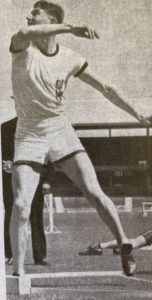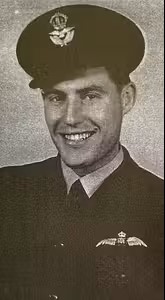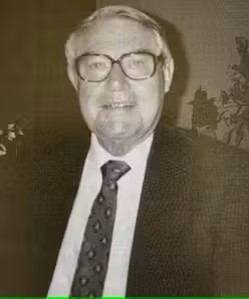Born in 1919, Jack Refshauge attended Caulfield Grammar School from 1929 to 1938. He was School Captain in 1938. An outstanding sportsman, Jack was a member of the first football team for five years from 1934 to 1938. He was team captain from 1936 to 1938, the 1938 team winning the Associated Grammar Schools of Victoria (AGSV) premiership. He was also an outstanding athlete, captaining Caulfield’s premiership athletics teams in 1937 and 1938.
At the 1938 AGSV Athletics Sports Jack won the 100 yards in equal record time, the 220 yards in equal record time and the 440 yards in a time that was only just outside the record. In his pet event, the shot put, he won the open division for the third consecutive year and extended the record he had first created in 1936. In three years he added nearly seven feet to the AGSV shot put record, his 1938 effort also being a Victorian schoolboy record.

After completing his secondary school studies, Jack began a science degree at the University of Melbourne but war was declared before he had completed his first year. He joined the RAAF in 1940 and, after a period of training in Australia, travelled to England where he became a member of the RAF’s 41 Squadron as a Spitfire pilot. He took part in bombings over Germany but in June 1944 Jack’s aeroplane was shot down (accidently by the Americans) over the Omaha Beachhead, leaving him badly wounded down the left side. He was rescued from the water and then spent a period of recuperation in England. In less than a year he returned to operations but was shot down again over Holland. This time he parachuted to safety and avoided major injury. Once again, he was the victim of ‘friendly’ fire.

After a period India toward the end of the war, Jack returned to Melbourne, switching from studying science to medicine. He married Diana Stoney in 1949 (they eventually had four children) and completed his medical degree at the end of 1951. He then spent three years as a Resident at the Alfred Hospital, during which he developed an interest in becoming an ear, nose and throat specialist. As he had a young family to support he joined a general practice in Newport but then moved to Williamstown, becoming increasingly involved in ear, nose and throat cases.
Having excelled in boxing and athletics at university, Jack’s wartime injuries restricted his post-war sporting activities to some degree but he combined his sporting interests with his professional qualifications to become medical officer to the Australian Boxing Federation and then club doctor to both the Melbourne and North Melbourne Football Clubs. Golf soon became a passion and he became a very competent player.
Jack gave service in a honorary capacity to many organisations. For example, he was involved for some 40 years with the Lord Mayor’s Camp at Portsea, President of the Victorian Council on Fitness and General Health, President of the Australian Sports Medicine Federation, Vice-President of the Federation Internationale de Medicine Sportive and President of the Sports Federation of Victoria (now VIC Sport). He served the Williamstown Hospital in various capacities for 27 years and, for his outstanding work, was made a Fellow of the Royal College of Surgeons without examination in 1983.

After he retired from operating in 1985, Jack maintained a consulting practice and also became involved with the Footscray Institute of Technology (now Victoria University) as chair of its ethics committee. He had long been involving in trying to reform unethical practices in the sporting industry. In 1993 the Jack Refshauge Chair of Movement Science was established at Victoria University in recognition of his “outstanding achievements in sport and education in Victoria”. He was awarded the OBE in 1979 and made a Member of the Order of Australia in 1987 for his service to sports medicine. After his death in 1999, the Sunshine Hospital’s committee named its rehabilitation ward after him.
(Major source: Dennis Carroll, The Associated Grammar Schools of Victoria. A Sporting and Social History, Dennis Carroll, 2009 (profile on Jack Refshauge, p 72)



